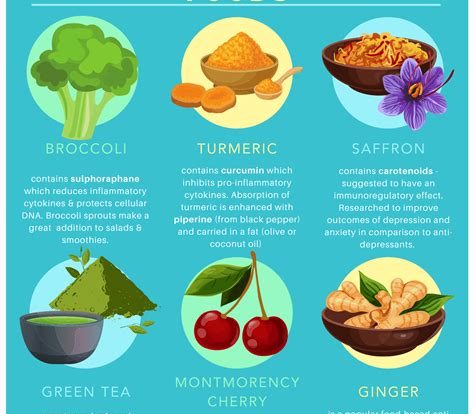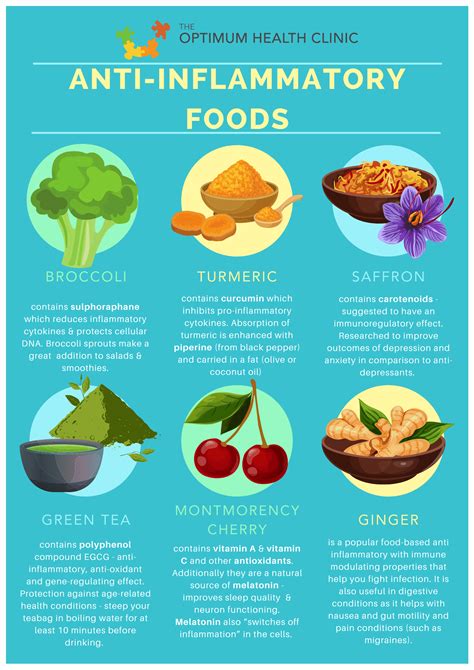

Inflammation diet aims to reduce chronic inflammation in the body by emphasizing on whole foods, fruits, vegetables, and healthy fats.
Are you tired of feeling bloated and uncomfortable after every meal? Do you suffer from joint pain and headaches on a daily basis? The answer could be as simple as changing your diet. Research has shown that incorporating an inflammation diet can have a significant impact on reducing inflammation in the body, leading to improvements in overall health and wellbeing.
Firstly, let’s define what inflammation is. It’s a natural response of the body’s immune system to injury or infection. However, when inflammation becomes chronic, it can lead to a range of health problems, including heart disease, diabetes, and even cancer. While medication can help manage inflammation, it’s also essential to consider the role of diet in reducing inflammation.
The inflammation diet focuses on consuming foods that are rich in anti-inflammatory properties, such as fruits, vegetables, whole grains, and healthy fats. It also involves avoiding foods that can trigger inflammation, such as processed foods, refined sugars, and trans fats.
So, if you’re looking for a natural way to reduce inflammation and improve your overall health, it’s time to consider the inflammation diet. With a few simple changes to your eating habits, you could be on your way to a healthier, happier life.
Daftar Isi
The Power of Inflammation Diet
There has been a growing interest in the relationship between diet and inflammation. Inflammation is a natural process that helps the body fight off infections and repair damaged tissue. However, chronic inflammation is linked to various health conditions such as heart disease, diabetes, and cancer. The good news is that a healthy diet can help reduce inflammation and improve overall health.
What is an Inflammation Diet?
An inflammation diet is a way of eating that focuses on foods that can help reduce inflammation in the body. It involves avoiding or limiting foods that are known to cause inflammation, such as processed foods, refined sugars, and saturated fats. Instead, it emphasizes foods that are rich in anti-inflammatory nutrients, such as fruits, vegetables, whole grains, and healthy fats.
The Benefits of an Inflammation Diet
An inflammation diet has numerous benefits for overall health. It can help reduce the risk of chronic diseases such as heart disease, diabetes, and cancer. It can also improve digestion, boost energy levels, and promote weight loss. Additionally, an inflammation diet can help improve mental health by reducing symptoms of depression and anxiety.
Foods to Eat on an Inflammation Diet
When following an inflammation diet, it’s important to focus on nutrient-dense foods that can help reduce inflammation in the body. Some of the best foods to eat include:
- Leafy green vegetables such as kale, spinach, and collard greens
- Berries such as blueberries, raspberries, and strawberries
- Fatty fish such as salmon, tuna, and sardines
- Nuts and seeds such as almonds, walnuts, and chia seeds
- Healthy fats such as avocado, olive oil, and coconut oil
- Whole grains such as quinoa, brown rice, and oatmeal
Foods to Avoid on an Inflammation Diet
While there are many foods that can help reduce inflammation, there are also foods that can make inflammation worse. Some of the worst offenders include:
- Sugar-sweetened beverages such as soda and energy drinks
- Processed foods such as chips, crackers, and cookies
- Red and processed meats such as bacon, sausage, and hot dogs
- Fried foods such as french fries and fried chicken
- Trans fats found in margarine, shortening, and many baked goods
Putting It All Together
Following an inflammation diet can be challenging at first, but with a little planning and preparation, it can become a way of life. Start by focusing on adding more anti-inflammatory foods to your diet, such as leafy greens, berries, and fatty fish. Gradually phase out processed foods and other inflammatory foods, replacing them with healthier options such as whole grains and healthy fats. Remember to listen to your body and make adjustments as needed.
The Bottom Line
An inflammation diet is a powerful tool for reducing inflammation and improving overall health. By focusing on nutrient-dense foods and avoiding or limiting inflammatory foods, you can help reduce the risk of chronic diseases, improve digestion, boost energy levels, and promote weight loss. If you’re looking to improve your health, consider giving an inflammation diet a try.
Introduction: Inflammation and Its Effects on Health
Inflammation is a natural response of the immune system to protect the body from injury, infection, or toxins. However, when inflammation becomes chronic, it can lead to various health problems such as cancer, diabetes, heart disease, and more. Chronic inflammation is caused by factors such as stress, pollution, lack of exercise, and unhealthy diet. Diet plays a crucial role in managing inflammation in the body.
Whole Food Diet
Whole foods are rich in antioxidants and anti-inflammatory compounds that can lower inflammation in the body. These foods include fruits, vegetables, whole grains, nuts, and seeds. The antioxidants and anti-inflammatory compounds found in these foods such as flavonoids, carotenoids, and omega-3 fatty acids can reduce inflammation and protect against chronic diseases.
Avoid Processed Foods
Processed foods often contain refined carbohydrates, sugar, saturated fats, and trans-fats that can trigger inflammation in the body. Consuming these foods regularly can increase the risk of chronic diseases and worsen existing conditions. To reduce inflammation, it’s important to avoid processed foods and opt for whole foods instead.
Gluten-Free Diet
Some people may experience inflammation when they consume gluten, leading to autoimmune diseases such as celiac disease or gluten sensitivity. A gluten-free diet can reduce inflammation and symptoms of autoimmune diseases. Gluten-free options include rice, corn, quinoa, and potatoes.
Low Glycemic Load Diet
Foods with a high glycemic load such as white bread, pasta, and rice release glucose rapidly into the bloodstream, leading to inflammation. A low glycemic load diet involves choosing complex carbohydrates, healthy fats, and proteins which release glucose more slowly, leading to lower inflammation. Examples of low glycemic load foods include sweet potatoes, quinoa, and lentils.
Mediterranean Diet
The Mediterranean diet is rich in anti-inflammatory foods such as fruits, vegetables, whole grains, legumes, fish, and healthy fats such as olive oil. This diet reduces the consumption of red meat, dairy, and processed foods which can trigger inflammation in the body. Studies have shown that following a Mediterranean diet can reduce inflammation and improve overall health.
Anti-Inflammatory Spices
Spices such as ginger, turmeric, garlic, and cinnamon have anti-inflammatory properties that can reduce inflammation and its adverse effects on the body. Incorporating these spices into your diet can be a flavorful way to manage inflammation.
Omega-3 Fatty Acids
Omega-3 fatty acids are found in fatty fish such as salmon, sardines, and mackerel. These fatty acids have anti-inflammatory properties that can reduce inflammation in the body. Omega-3 supplements or adding more oily fish to the diet can help reduce inflammation.
Probiotics and Prebiotics
Gut health is closely related to inflammation. Consuming probiotic-rich foods such as kimchi, yogurt, and kefir, and prebiotic foods such as garlic, onions, and asparagus can improve gut health and reduce inflammation.
Conclusion: Incorporating an Anti-Inflammatory Diet into Daily Life
Incorporating an anti-inflammatory diet, rich in whole foods, spices, omega-3 fatty acids, and probiotics, can reduce inflammation in the body and improve overall health. Avoiding processed foods and maintaining a balanced diet can also go a long way in reducing inflammation and protecting against various diseases. By making small changes to your diet, you can manage inflammation and improve your well-being.
As a journalist, it is important to report on the latest health trends and diets that are gaining popularity. One such diet is the inflammation diet. This diet claims to reduce inflammation in the body, which is believed to be the root cause of many chronic diseases.
Pros of the Inflammation Diet:
- The diet focuses on whole, nutrient-dense foods such as fruits, vegetables, lean proteins, and healthy fats. This can lead to improved overall health and weight loss.
- The diet eliminates processed and refined foods, which are known to contribute to inflammation in the body.
- Studies have shown that following an anti-inflammatory diet can reduce the risk of chronic diseases such as heart disease, diabetes, and even cancer.
Cons of the Inflammation Diet:
- The diet can be restrictive and difficult to follow long-term, especially for those who are accustomed to a diet high in processed foods.
- Eliminating entire food groups, such as dairy or gluten, can lead to nutrient deficiencies.
- Some experts argue that inflammation is a natural process in the body and reducing it too much can actually harm the immune system.
Overall, the inflammation diet may be beneficial for those with chronic inflammation or autoimmune conditions. However, it is important to consult with a healthcare professional before making any drastic changes to your diet.
As we go through our daily lives, we are constantly exposed to various environmental factors that can cause inflammation in our bodies. Inflammation is a natural response by the immune system to fight off infections or injuries. However, chronic inflammation can lead to serious health problems such as heart disease, cancer, and diabetes. Fortunately, there is an inflammation diet that can help reduce inflammation and improve overall health.
The inflammation diet focuses on consuming foods that are high in anti-inflammatory properties. These foods include fruits and vegetables, whole grains, nuts, and fatty fish. On the other hand, processed foods, refined sugars, and saturated fats are known to cause inflammation and should be avoided. Additionally, cooking methods such as frying and grilling can also contribute to inflammation. Therefore, it is recommended to prepare meals using methods such as steaming, baking, or sautéing.
Incorporating the inflammation diet into your daily routine can have numerous benefits, including improved heart health, better digestion, and reduced risk of chronic diseases. Furthermore, adopting healthy lifestyle habits such as regular exercise, stress management, and getting enough sleep can also help reduce inflammation. It is important to note that the inflammation diet is not a quick fix but rather a long-term lifestyle change.
As you consider adopting the inflammation diet, keep in mind that it is always best to consult with a healthcare professional before making any major dietary changes. With dedication and consistency, the inflammation diet can be an effective way to improve your health and well-being.
Video inflammation diet
As a journalist, people frequently ask about the inflammation diet. Here are some common questions and their answers:
-
What is the inflammation diet?
The inflammation diet is a way of eating that focuses on consuming foods that reduce inflammation in the body and avoiding foods that contribute to inflammation. Inflammation is a natural process that helps the body heal, but chronic inflammation can lead to a variety of health problems.
-
What foods should I eat on the inflammation diet?
Foods that are high in anti-inflammatory compounds, such as fruits, vegetables, whole grains, nuts, and fatty fish, are good choices on the inflammation diet. Some specific examples include blueberries, kale, quinoa, almonds, and salmon.
-
What foods should I avoid on the inflammation diet?
Foods that are high in sugar, saturated fats, and processed ingredients should be avoided on the inflammation diet. Examples include sugary drinks, fried foods, and white bread.
-
Can the inflammation diet help with health conditions?
There is evidence to suggest that the inflammation diet may help with certain health conditions, such as rheumatoid arthritis, psoriasis, and inflammatory bowel disease. However, more research is needed to fully understand the impact of the inflammation diet on these conditions.
-
Is the inflammation diet suitable for everyone?
The inflammation diet is generally considered a healthy way of eating, but it may not be appropriate for everyone. It is important to talk to a healthcare provider before making significant changes to your diet, especially if you have a health condition or are taking medication.






